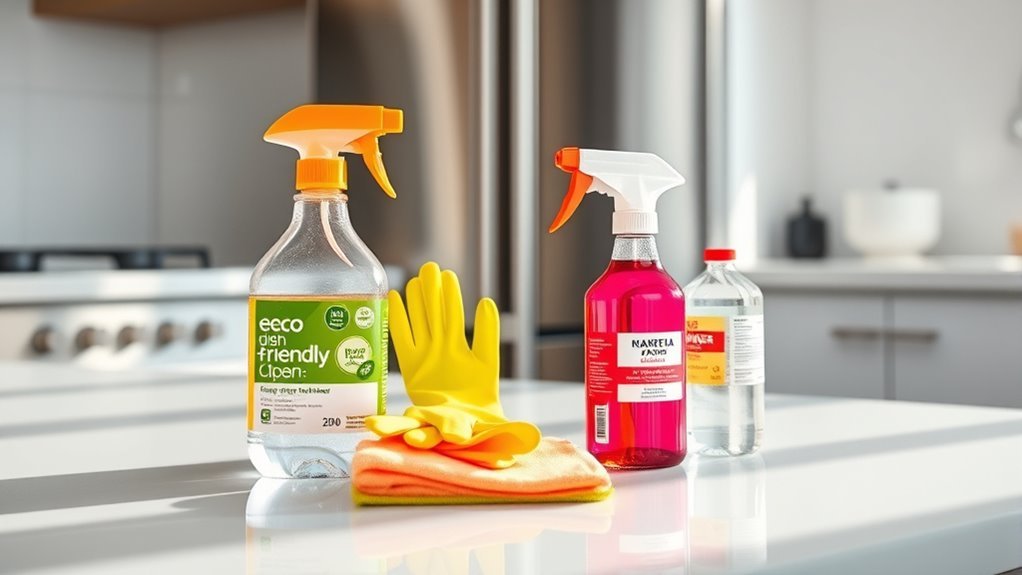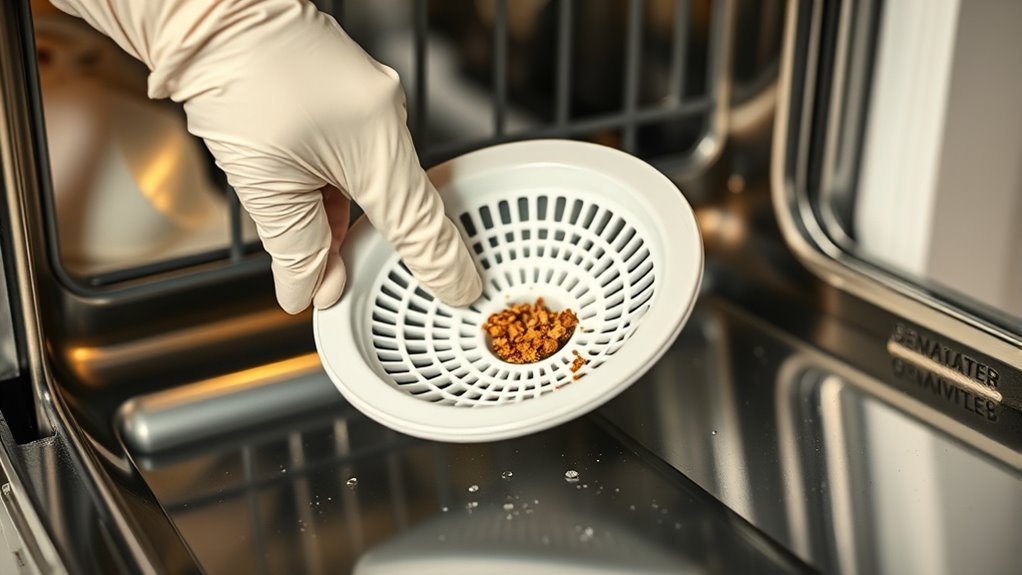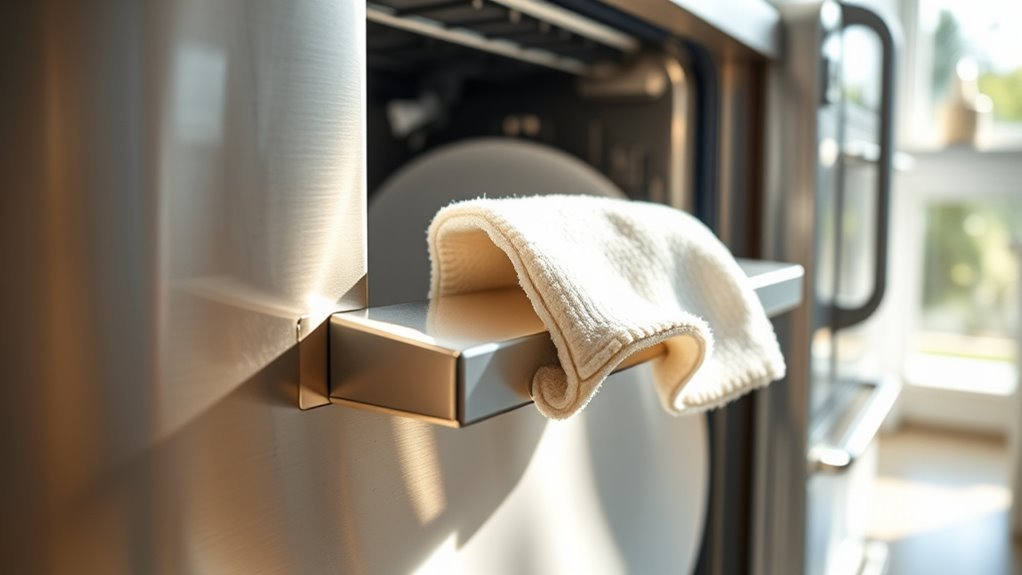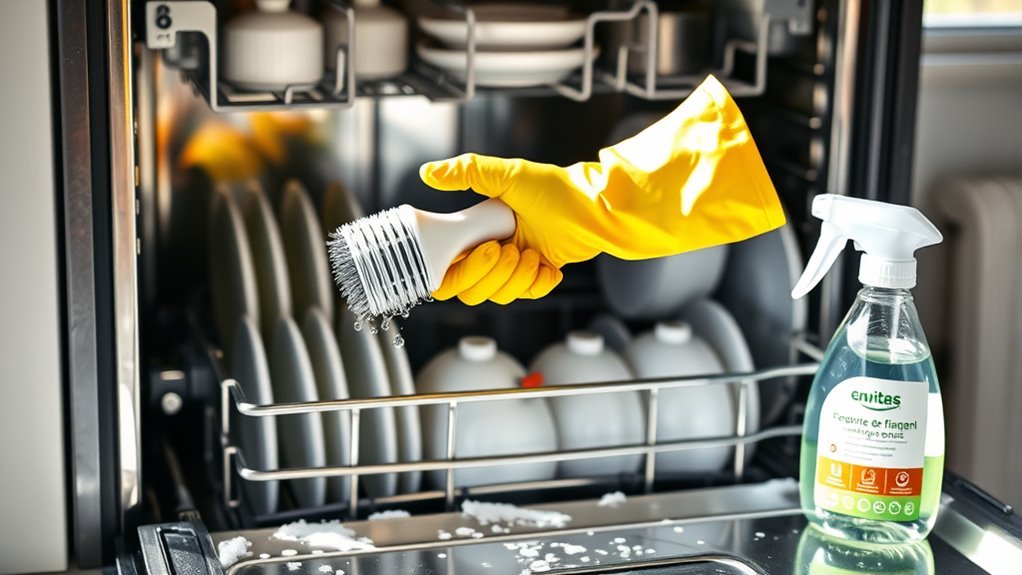How to Clean Dishwasher
To clean your dishwasher, start by gathering supplies like a soft brush, microfiber cloth, and white vinegar. Remove and wash racks and the drain filter thoroughly, then clear spray arm holes with a toothpick and soak them in vinegar. Wipe down door seals and exterior surfaces gently. Running a vinegar cycle and using baking soda helps deodorize. Don’t forget to check the drain hose for blockages regularly. Keep up with these steps, and you’ll find more tips to maintain your dishwasher’s performance and lifespan.
Gather Cleaning Supplies

Before you start cleaning your dishwasher, you’ll need to gather a few essential supplies. Having the right cleaning tools on hand guarantees you’re ready to tackle the job efficiently and regain control over your kitchen’s cleanliness. Start with a soft brush or old toothbrush to reach tight spots. Grab a microfiber cloth for wiping down surfaces without scratching. You’ll also want a cup of white vinegar or a dishwasher-safe cleaner to break down grime and buildup. Don’t forget a sponge or scrub pad for stubborn residue. These essential supplies help you maintain your dishwasher’s performance freely and effortlessly, avoiding costly repairs or replacements. With your cleaning tools ready, you’re set to restore your dishwasher’s shine and keep your kitchen running smoothly.
Remove and Clean Dishwasher Racks
Start by carefully detaching the dishwasher racks to avoid any damage. Once removed, wash them thoroughly using a mild detergent and a soft cloth or sponge. This simple step helps keep your racks clean and extends their lifespan.
Detach Racks Carefully
Gently pull out the dishwasher racks to avoid bending or breaking them. You want to maintain rack stability, so take your time and guarantee you’re using proper handling techniques. Don’t force the racks out; instead, slide them smoothly along the tracks. If you feel resistance, check for any clips or locks that might be holding the racks in place. Carefully detaching them prevents damage and keeps your dishwasher functioning freely. Once removed, you’ll have better access to clean every nook and cranny, but always remember that these racks are designed to support your dishes securely—treat them with respect during removal. Taking these steps guarantees your dishwasher racks stay intact, preserving their stability and extending their lifespan.
Wash With Mild Detergent
Scrub your dishwasher racks using a mild detergent to remove food particles and buildup without damaging the coating. Choosing a gentle cleaner guarantees the racks stay intact longer, preserving the dishwasher’s efficiency and your freedom from frequent repairs. You don’t need harsh chemicals to get the job done—mild detergent benefits include safe cleaning and maintaining the rack’s protective layer. For best results, stick to a regular cleaning frequency, like once a month, to prevent stubborn grime.
Here’s how to wash your racks effectively:
- Use a soft sponge dipped in mild detergent solution
- Focus on corners and crevices where debris hides
- Rinse thoroughly with warm water to avoid residue
- Let racks air dry fully before placing them back
This simple routine keeps your dishwasher running smoothly, freeing up your time.
Inspect and Clear the Drain Filter

One essential step in maintaining your dishwasher’s efficiency is inspecting and clearing the drain filter. Over time, food particles and debris accumulate in the filter, restricting water flow and causing unpleasant odors. To keep your dishwasher running smoothly, you’ll want to perform regular filter maintenance. Start by removing the bottom rack and locating the drain filter at the base. Twist or lift it out carefully, then rinse it under warm water to remove trapped gunk. Use a soft brush if needed for stubborn bits. Clearing this filter regularly guarantees proper drain cleaning, preventing clogs and improving overall performance. Taking just a few minutes for this upkeep frees you from costly repairs and keeps your dishwasher fresh and efficient.
Clean the Spray Arms
Remove the spray arms from your dishwasher to guarantee they’re free of debris and buildup. Regular spray arm maintenance is essential for peak water flow and a thorough clean. You’ll want to use effective cleaning techniques to keep them in top shape without hassle.
Start by rinsing the spray arms under warm water, then use a toothpick or small brush to clear clogged holes. Soak them in a vinegar solution to dissolve mineral deposits. Finally, give them a good rinse to remove loosened grime.
Rinse spray arms with warm water, clear holes with a toothpick, soak in vinegar, then rinse thoroughly.
Imagine:
- Tiny holes releasing powerful jets of water
- Vinegar loosening stubborn calcium buildup
- A toothpick clearing blocked spray nozzles
- Spray arms spinning freely, delivering spotless dishes
With these steps, you’re free to enjoy a dishwasher that truly does its job.
Wipe Down the Door Seals and Exterior

A clean dishwasher door not only looks better but also helps keep your appliance running smoothly. Regular door seal maintenance prevents leaks and keeps your dishwasher airtight. Start by wiping the door seals gently with a damp cloth to remove grime and buildup. For exterior cleaning, use a mild detergent and a soft cloth to keep the surface spotless without damage.
| Task | Tip |
|---|---|
| Door Seal Maintenance | Use a soft cloth, avoid harsh chemicals |
| Exterior Cleaning | Mild detergent works best |
| Frequency | Weekly for seals, biweekly for exterior |
Run a Vinegar Wash Cycle
After wiping down the door seals and exterior, you’ll want to tackle the interior buildup that’s harder to reach. Running a vinegar wash cycle is a simple way to refresh your dishwasher and enjoy the vinegar benefits—natural cleaning power without harsh chemicals. Just place a cup of white vinegar in a dishwasher-safe container on the top rack and run a hot water wash cycle. This helps dissolve mineral deposits, grease, and grime trapped inside. Imagine:
- Sparkling spray arms spinning freely
- Shiny, residue-free interior walls
- A fresh, clean scent replacing odors
- Improved water flow during wash cycles
This method frees your dishwasher from buildup, so it works efficiently and keeps your dishes spotless. It’s a quick, liberating step towards a cleaner kitchen.
Use Baking Soda for Deodorizing
You can use baking soda to naturally deodorize your dishwasher and eliminate lingering odors. Simply sprinkle a cup of baking soda across the bottom and run a short hot water cycle. This easy step not only freshens but also helps maintain a clean interior.
Baking Soda Benefits
Baking soda works wonders when it comes to deodorizing your dishwasher. As a natural odor neutralizer, baking soda frees your appliance from lingering smells without harsh chemicals. It’s a simple, eco-friendly solution that lets you maintain freshness effortlessly.
Here’s why baking soda is your go-to for dishwasher care:
- Absorbs stubborn odors trapped in tight corners
- Gently lifts grime without scratching surfaces
- Supports a chemical-free, healthy kitchen environment
- Easily accessible and affordable for regular use
Application Tips
To freshen up your dishwasher, sprinkle a cup of baking soda along the bottom before running a short hot water cycle. This simple step helps deodorize and brighten your appliance without harsh chemicals. For effective dishwasher maintenance, make this a routine part of your cleaning frequency—ideally once a month. You’ll keep odors at bay and prevent grime buildup that can impact performance. Avoid overusing detergents or rinsing agents, as baking soda naturally balances pH and neutralizes odors. By integrating this easy tip, you reclaim control over your kitchen’s cleanliness without extra hassle. Embrace this freedom from stubborn smells and maintain a fresh, efficient dishwasher effortlessly—your dishes and your space will thank you.
Check and Clean the Dishwasher Drain Hose
Although it’s often overlooked, the dishwasher drain hose plays an essential role in preventing clogs and ensuring proper drainage. Keeping up with drain hose maintenance frees you from unexpected backups and messy spills. To check and clean it, start by unplugging your dishwasher and disconnecting the hose gently. Look inside for debris or buildup that could block water flow.
The dishwasher drain hose is key to preventing clogs—regular checks keep drainage smooth and spills away.
Here’s what you should do:
- Inspect the hose for cracks or kinks restricting drainage
- Use a flexible brush or a long pipe cleaner to clear blockages
- Flush the hose with warm water to remove loosened debris
- Reattach securely to avoid leaks and maintain smooth drainage
Regular attention here means fewer clogs and more freedom from dishwasher troubles.
Maintain Your Dishwasher Regularly
Since your dishwasher handles a lot of grime and food particles, maintaining it regularly is key to keeping it running smoothly and extending its lifespan. You’ll want to adopt simple dishwasher maintenance tips like wiping down the door seals, cleaning the filter weekly, and running an empty cycle with a dishwasher cleaner monthly. These regular cleaning practices prevent buildup, odors, and clogs without much effort. Don’t forget to inspect spray arms for blockages and verify racks slide freely. By sticking to these easy steps, you free yourself from unexpected breakdowns and costly repairs. Keeping your dishwasher in top shape means more time enjoying life and less time worrying about chores—embrace these habits, and your machine will reward you with efficient, hassle-free cleaning every load.
Frequently Asked Questions
Can I Use Bleach to Clean My Dishwasher?
You probably shouldn’t use bleach to clean your dishwasher since it can damage rubber seals and cause corrosion. Instead, try bleach alternatives like white vinegar or baking soda, which are safer and still effective. For disinfecting methods, running a hot water cycle with these natural cleaners can keep your dishwasher fresh without harsh chemicals. This way, you’re free to maintain cleanliness without risking your appliance’s longevity or your health.
How Often Should I Replace My Dishwasher Racks?
Think of your dishwasher racks like the trusty sails on your ship—they carry the cargo but wear down over time. You should keep an eye on rack maintenance, checking for rust, broken tines, or peeling coating. When these replacement signs show up, it’s time to swap them out to keep your dishwasher running smoothly. Don’t let worn racks limit your freedom; timely replacement guarantees you keep sailing through clean dishes without hassle.
Is It Safe to Run a Dishwasher When I’m Not Home?
You might wonder if it’s safe to run your dishwasher when you’re not home. Generally, modern dishwashers are designed with dishwasher safety in mind, making it okay to operate them unattended. However, since it’s a home appliance with water and electricity, there’s always a small risk of leaks or malfunctions. If you want peace of mind and freedom, consider smart models with alerts or automatic shutoffs to keep things worry-free.
Can Homemade Dishwasher Detergent Harm My Machine?
You might wonder if homemade detergent could harm your machine, and it’s a valid concern. While making your own cleaner gives you freedom from harsh chemicals, not all recipes are machine-safe. Some homemade detergents can cause buildup or damage seals. To protect your dishwasher’s longevity, choose homemade formulas carefully, avoiding abrasive ingredients. That way, you keep your machine safe while enjoying control over what goes inside it.
What Causes Dishwasher Odors Besides Dirty Filters?
Imagine opening your dishwasher to a scent that’s less fresh breeze, more forgotten leftovers. Besides dirty filters, odors often come from trapped food residue stuck in crevices or from stagnant water pooling in hidden corners. These unseen culprits hold onto smells, limiting your freedom to enjoy a clean kitchen experience. To keep things fresh, you’ll want to regularly check and clear out these spots so odors don’t take over.






